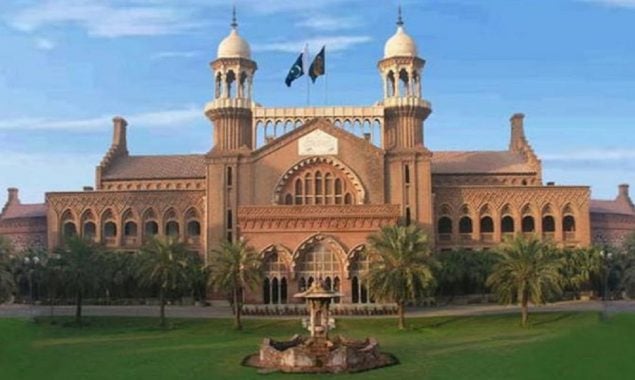
A view of Lahore High Court building. Image: File
LAHORE: The Lahore High Court has ruled that a man and a woman who married without completion of the latter’s Iddat period cannot be held guilty of committing offence of Zina(Enforcement of Hudood) Ordinance, 1979 as it would be termed as irregular marriage.
In its judgment Justice Ali Zia Bajwa held that, “It is a settled Islamic law that the marriage entered into by a divorced lady before the completion of Iddat period would be irregular marriage and not void marriage. An irregular marriage may have its own consequences under Muslim Personal law but the same cannot be treated as void and union of husband and wife, in consequence of Nikah cannot be regarded as a cognizable offence, as defined under section 4 and punishable under section 5 of Offence of Zina (Enforcement of Hudood) Ordinance, 1979, entailing penal consequences.”
In order to define the Idaat, the judge quoted Islamic scholar D.F. Mullah in who interpreted it as the period during which it is incumbent upon a woman, whose marriage has been dissolved by divorce(90 days) or death(four lunar months and 10 days) to remain in seclusion, and to abstain from marrying another husband.
As per law laid down in Mullah’s Muhammadan Law, there are two kinds of invalid marriage i.e. irregular and void. Irregular marriage is one where impediment to the validity of such marriage is temporary while in case of void marriage, such impediment is permanent. A marriage which is irregular cannot be treated as void marriage. The union of husband and wife in irregular marriage cannot be regarded against un-Islamic or Shariah, the judgment read.
Muhammadan Law further explained that following marriages have been considered irregular: (i) A marriage without witnesses. (ii) A marriage with a woman undergoing ‘iddat’. (iii) A marriage prohibited by reason of difference of religion. (iv) A marriage with two sisters, or contrary to the rules of unlawful conjunction. (v) A marriage with a fifth wife.”
Ameer Bakhsh has moved a petition in the LHC, contending that Amna Bibi was legally married to him and she was residing in his house being his legally wedded wife. She, with mala fide intentions, secretly filed a suit for dissolution of marriage and got the same decreed ex-parte against the petitioner from family court vide order issued January 20, 2021.
He pointed out he challenged the decree by filing an application for setting aside ex-parte proceedings and decree, which is still pending adjudication before the concerned family court. After obtaining the ex-parte decree of dissolution of marriage, Amna Bibi got married to Muhammad Ismail on the very next day January 21, 2021 without observing the period of Iddat as ordained by Allah Almighty in the Holy Quran. He said the act of Aman and Ismail is against the teachings of Islam and amounts to committing of offence of Zina as defined under section 4 and punishable under section 5 of Offence of Zina (Enforcement of Hudood) Ordinance, 1979, which is a cognizable offence but the justice of peace (a sessions judge) dismissed his petition seeking lodging of FIR against the couple. To substantiate his arguments, he presented different judgment of the Supreme Court and said as per law laid down by the Supreme court, even if marriage of Aman and Ismail is considered as an irregular marriage, they are guilty of offence of Zina as provided under section 4 of the Offence of Zina (Enforcement of Hudood) Ordinance, 1979.
“I do not agree with this contention because perusal of all these precedents transpires that all these decisions were rendered by the Constitutional Courts before December 1st, 2006 when Protection of Women (Criminal Laws Amendment) Act, 2006 was not in existence and language of section 4 of the Offence of Zina (Enforcement of Hudood) Ordinance, 1979 was as follows:
- “ Zina. A man and a woman are said to commit zina if they willfully have sexual intercourse without being validly married to each other.
Explanation: Penetration is sufficient to constitute the sexual inter-course necessary to the offence of zina.”
All the precedents relied upon by the petitioner side had interpreted the word “validly married” and had held that in section 4 of the Ordinance, 1979, the word “married” qualifies by the word “validly” and a valid marriage is one which is affected abiding by all the Injunctions of Islam regarding Nikah, meaning thereby that any marriage which has been solemnized in an invalid manner, whether irregular or void, falls out of the phrase “validly married” as used in section 4 of Offence of Zina (Enforcement of Hudood) Ordinance, 1979 and such marriage cannot exclude a sexual intercourse from the definition of “Zina”, the judge observed.
“But situation has altogether been changed after the promulgation of Women (Criminal Laws Amendment) Act, 2006, by which word “validly” was consciously omitted by the legislature. Now after the above-said amendment, section 4 of the Ordinance, 1979 runs as follows:
- Zina. A man and a woman are said to commit „zina‟if they willfully have sexual intercourse without being married to each other.” The legislature consciously omitted the word “validly” from section 4 of the Ordinance, 1979 and now spouses of an irregular marriage cannot be held guilty of offence of zina while relying upon the above-said precedents.
“The legislature consciously omitted the word “validly” from section 4 of the Ordinance, 1979 and now spouses of an irregular marriage cannot be held guilty of offence of zina while relying upon Supreme Court’s judgments, the judge concluded.
Catch all the Pakistan News, Breaking News Event and Latest News Updates on The BOL News
Download The BOL News App to get the Daily News Update & Follow us on Google News.




